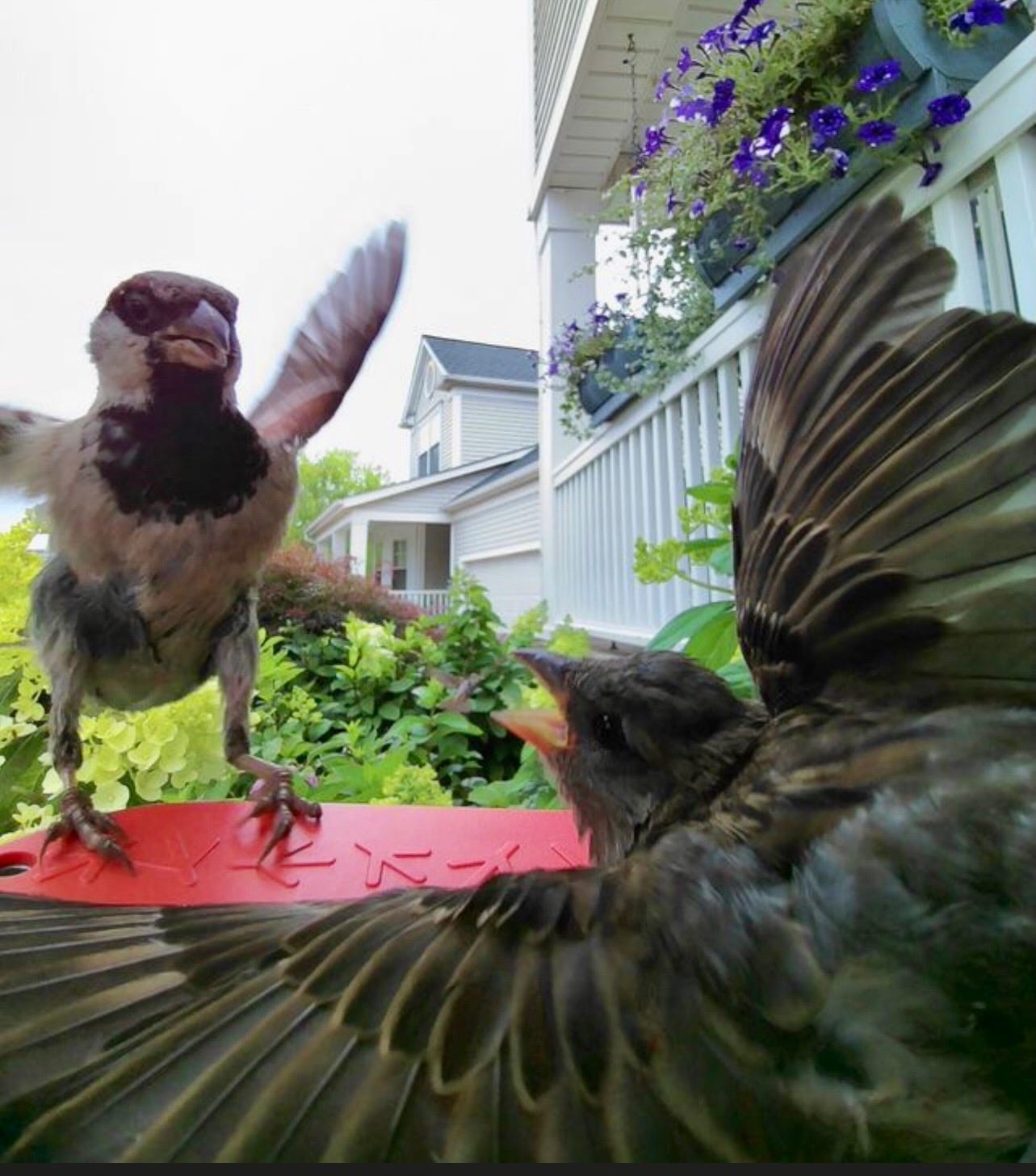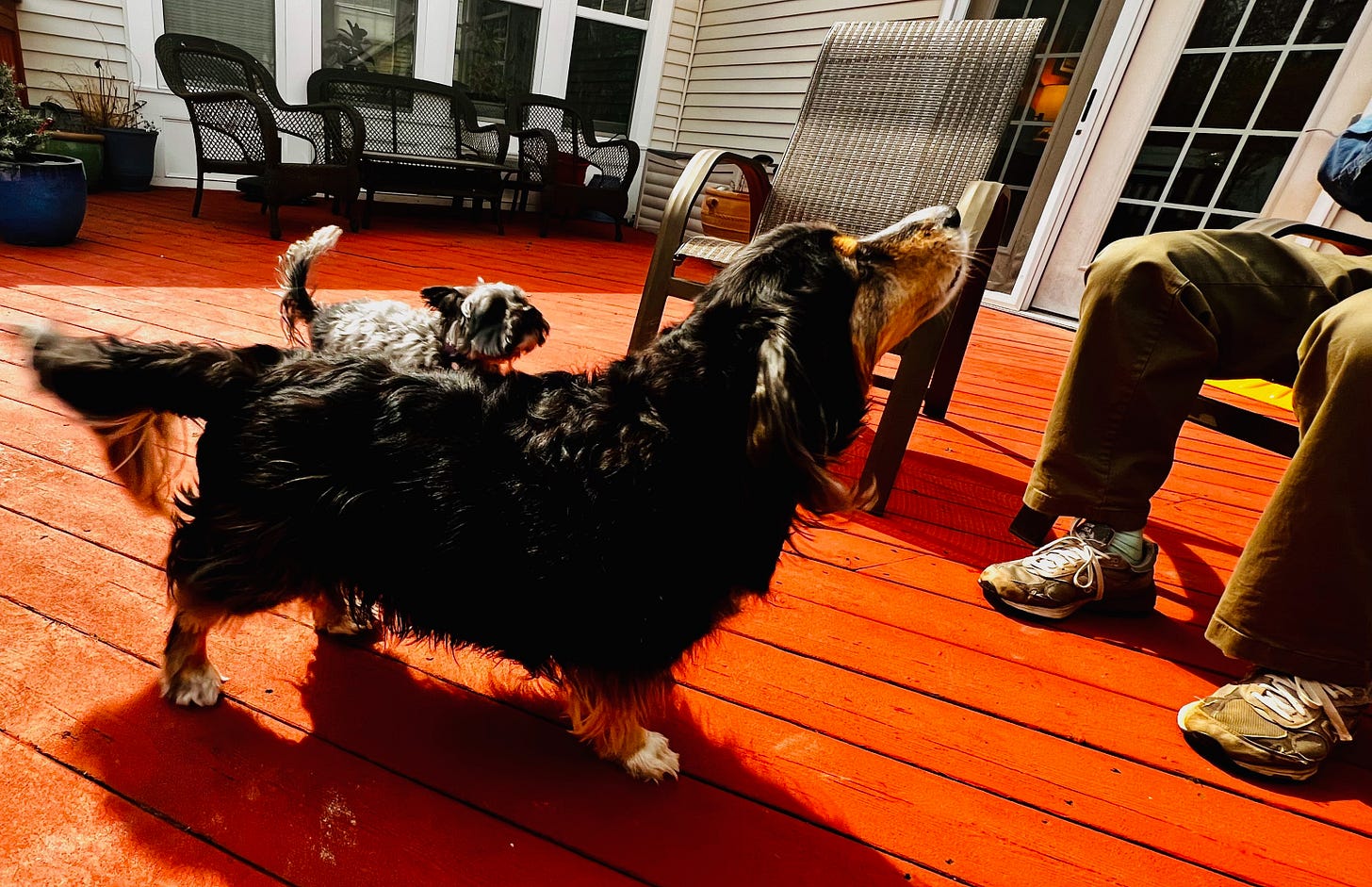
Living in Cleveland has been so exciting in recent days, mostly because everyone has been telling us how exciting it is to be us. So many visitors making pilgrimages to our city.
Last Sunday, the NCAA Women’s Final Four finished up here. The very next day, we experienced a total solar eclipse, a phenomenon that will not happen here again until September 14, 2099. By then, I will be 142, which is a nicer way of saying “long dead.”
Yesterday morning, on the day of the eclipse, I was awake by 5:07 and trying to stay still for a little while longer. I wanted to avoid stirring the dogs, because one peep out of them and my husband springs out of bed as if summoned by a bugle.
“Let him sleep,” I whispered to our younger dog, Walter, who had raised his right ear at the sound of my wide-awake breathing. He has the radar, that one. I reached down and gently pulled him closer, my hand on the beat of his tiny heart until I heard his sigh of surrender.
A small but mighty victory. For a few more minutes, I could listen to the sounds of daybreak.
At bedtime the night before, I had cracked open one of the windows farthest from our bed. Like my mother, I was born hot (Make your jokes if you must.) I knew it would be chilly—in the 40s during the night, 51 degrees upon awakening—but I love the fresh air and our bed is full of blankets and beating hearts. Cozy in winter. A raging inferno in August.
We live in the city, where the soundtrack is always a mix of nature and human endeavors. At 5:07 a.m., a train rumbled along nearby tracks; at 5:38, I heard the start of our neighbor’s truck in the driveway next door. In 12 minutes, he would pull into the plant parking lot. I wondered if the floor would pause for four whole minutes so that he and his coworkers could see the total eclipse.
It was still dark and softly raining, but that didn’t stop the birds from gossiping. We have so many of them here in Northeast Ohio. I used to know only the obvious ones. Robins and Cardinals. Squawking Blue Jays and cooing Mourning Doves. All those sparrows, finches and chickadee-dee-dee-dees.
In the last year, my expertise has grown by using two apps, one from Cornell Lab’s Merlin and the other for the Bird Buddy camera my daughter gave me. This would have made my mother so happy. One of my most enduring childhood memories of Mom is her standing on the tips of her Keds at the kitchen window to watch the birds at her feeder.
Dad had anchored it on a pole in front of the clotheslines so that she could see the birds even on bedsheet days. She would lean on the edge of the sink with the biggest smile on her face, reciting the birds’ names and imitating their calls.
When I was a teenager, I thought this was nuts. Now I think of it as evidence of her magic. Such a hard life, but my mother insisted on joy.
The birds around here are full of personality and some of them have issues, my apps tell me. Sparrows, who are so often dismissed as ordinary and irrelevant, are often the glue of the community. The white-crowned and house sparrows are “long-haul lovers” who hang out with all kinds of birds. They’re the peacemakers, while the dark-eyed juncos strut around starting brawls. Chipping sparrows—so many types of sparrows!—are loud-mouthed architects known for building grand nests. The brown-headed cowbird can’t be bothered with nesting at all. She dumps her eggs in the nests of other birds, who then raise them.
Imagine having to explain that home delivery to your long-haul lover. The crows in the tree across the street just cawed with laughter. They get me.
All the yakking birds yesterday seemed oblivious to the dramatic shift in the sky coming their way by mid-afternoon. My phone’s weather app predicted the rain would end by 7:30 a.m., but by breakfast a newscaster on our local public radio station said the rain wouldn’t stop until 9.
Uh-oh.
“Could be clouds today,” I told Sherrod as he handed me a mug of coffee.
“It’ll clear up,” he said. “We will be seeing that eclipse.” He had no reason to know this, but he has made a lifetime practice of not worrying about things he thinks he cannot change. Whenever he makes the mistake of telling me I worry too much, I remind him I’m doing it for both of us.
By 8:30, the rain had stopped, and two street-sweeping trucks whooshed past our house. I spend a lot of time with young children these days, which is probably why I watched those trucks and imagined a little one tugging on my sleeve to ask, “Why are they cleaning the streets now?”
“To improve the moon’s view,” I whispered to no one in the room. “We always tidy up for guests.” My imaginary friend smiled.
Cleveland was on the path of totality, which is the narrow track of the moon’s shadow across the Earth. The Cleveland Museum of Natural History described this path as “typically 1,000 miles long but only 100 miles wide,” and I always trust the museum. It was there, in the 1990s, that chief wildlife expert Harvey Webster informed me that geese migrating to Ohio are never to be called Canadian.
“They are not citizens of Canada, Connie, nor do they vote,” he said. “They are Canada geese.” In a subsequent interview, Harvey taught me that there are more than 50 types of gulls and not one of them is called a seagull. I spent a lot of time around Harvey feeling stupid, but he never rubbed it in.
Around 3 p.m. yesterday, the temperature began to drop, the wind picked up and the birds fell suddenly silent, except for a single Robin who seemed to be sounding the alarm. Sherrod and I were standing on our back deck with our two dogs, who were fascinated only by the sight of us wearing cardboard glasses. When the light began to fade, they thought it was time for dinner.
At 3:17 p.m., the sky over Cleveland went dark for nearly four minutes and filled with a bright, pulsing image of the moon as we’d never seen it before. No amount of advance coverage could have prepared us for these 240 seconds. Down the street, a group of neighbors’ voices erupted into sounds I’d always imagined we’d hear come out of our mouths if we ever encountered an angel.
If you saw the total eclipse, you have your own memories and you don’t need me messing with them. If you didn’t, I direct you to all the beautiful photos on social media. Here’s a gift link for the glorious thread of pictures in the New York Times, and another gift link for the Washington Post’s joyful coverage. NASA’s website is full of images and information, too. They can give you at least a glimpse of what it felt like to stand under the night sky in the middle of the afternoon and behold a moment that you knew you’d likely never again witness—in the same spot, with the same people—in your lifetime.
I did not expect to be this moved. But as Sherrod and I stood there, looking up at the sky, it was impossible not to think of the millions of other humans who stopped to lift their gaze along with us. We are all such small specks in the universe, but we are capable of big things in our limited time here. Look how curious we are, so open to discovery.
We are people who want to look up.
I’m going to hold on to this memory, and call it hope.







Connie, beautiful. I hope we are people who continue to want to look up. Voting for your husband, Sherrod Brown would be a step in that upwards direction
I don't think I've ever experienced another writer who has the extraordinary gift you have, Connie, of drawing me into your stories as if I am sitting there beside you witnessing your life observations as your shadow following you around. In this case, your moon shadow. I did not get that experience here in Tampa. I saw it all on tv but, honestly, it was your words, eloquently "spoken" which actually helped me FEEL what it was like. And that is what once in a lifetime moments are supposed to be about. Thank you for letting be your Moon Shadow for a moment.